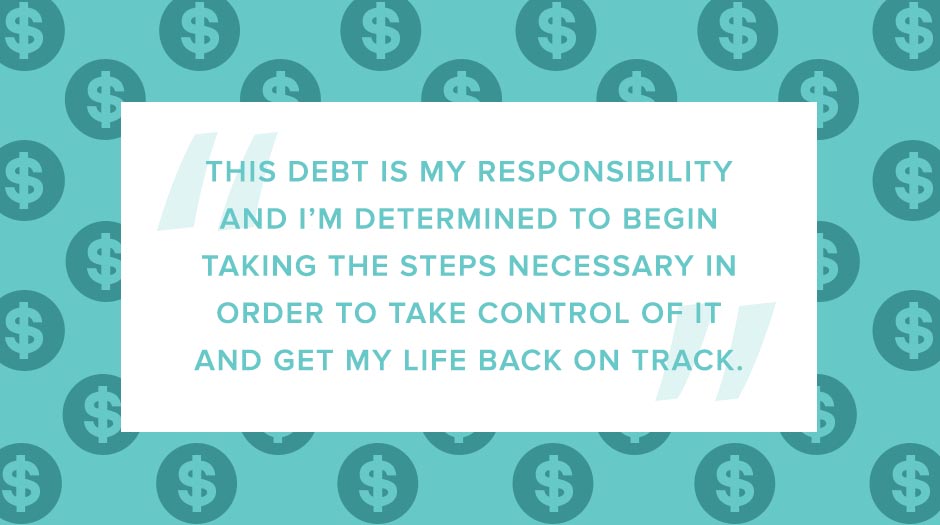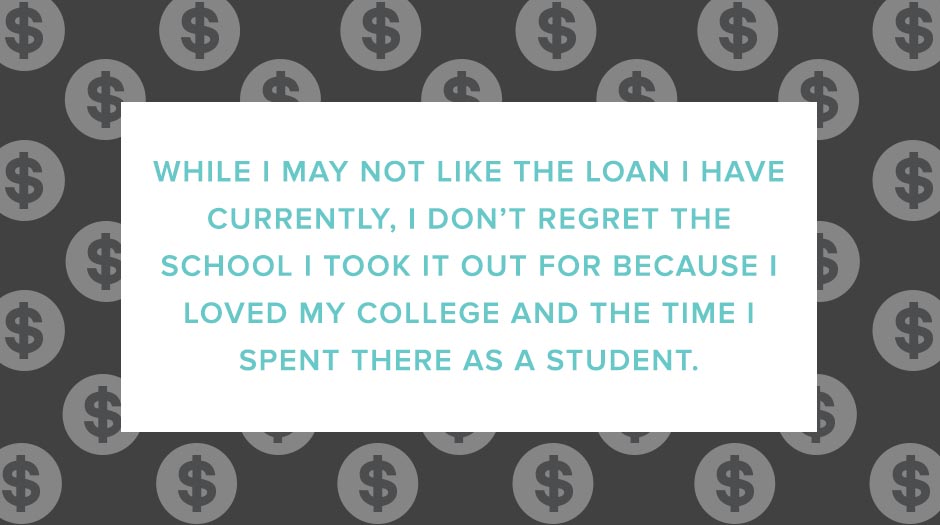This is a cautionary tale about the risks and rewards of student loans and the all-too-real bills that arrive six months after graduation. Read how one grad, several years into her career and repayments, handles her post-college debt.
I need to level with everyone for a moment: if you came to this post looking to read a success story of how a struggling, single girl managed to work really hard and give up lattes in order to pay off her towering stack of student loan bills in under six months, well… I’m not that girl. Not even close.
My story of student debt is a morbidly depressing saga and one you may find rings true to your own situation. Once upon a time, in 2006, a girl who lived in the Midwest with no money wanted to attend a private university in California that cost money. She fulfilled her dream and found out upon graduating that every dream comes with a price. This is a tale peppered with the follies of high interest rates, too many jobs with poor salaries, an unemployment stint I was not prepared for, big sacrifices, a LOT of swearing, and a red-hot hatred for Sallie Mae/Navient that won’t quit. There are also notes on human nature in my journey, revealing unfortunate characteristics including my resentment towards anyone who has significant money and denial about my financial issues. {Click to Tweet}
Writing this post is my attempt to face my situation head-on instead of hiding from it. Yes, I’m in debt and no, it is not good debt, but I got myself into it. This debt is my responsibility and I’m determined to begin taking the steps necessary in order to take control of it and get my life back on track.
HOW MUCH I OWE AND HOW IT HAPPENED
I owe $54,000 in student loans.
That is one of the hardest sentences I’ve ever had to write. It is also one I could never have written until a few months ago when I swallowed my pride (and a sip of wine) and steadied myself to look at my student loan debt total on the Navient website. I’ve never looked at this number before. Never. The last time I did, I pulled out my contact lenses so the numbers looked blurry - that’s how much in denial of my debt I’m in.
The graduating class of 2015, according to the Wall Street Journal, is said to have an average of $35,000 in student loans. It’s a sizable jump from 2014’s $29,000, with 71% of graduates with a bachelor’s degree exiting their campus already in debt - a debt that only continues to keep rising.

As I mentioned earlier, I went into debt for college. I grew up in the Midwest and wanted to venture out to a new state and city for school and see what it was like to live in a new environment unlike the one where I was born and raised. In 2006, when I was a senior in high school, I found my dream college on a postcard that came in the mail. However, at the time I was too young to sign a loan document alone to pay the cost of my education. I would need a cosigner and there were none to be found. My parents made it very (expletive) clear that they would not cosign any loan statements for me. If I couldn’t pay, the next person who would be asked to pony up that money would be mom and dad - neither of which had the financial means to assist me.
In retrospect, it was the best thing that ever happened to me because had I not been underage, I would most likely be in twice the debt amount now. But at the time, it was totally heartbreaking. My dream college went back on the shelf. I enrolled in a community college where I was able to get all of my general education credits out of the way, even taking classes during the summer to speed up the process so I could spend less time in college. I never forgot about my dream school though and worked hard at community college so that I could reapply there in 2008 and transfer in.
As a transfer student, I only went to my university for two years. However, it was still a private university and I was an out-of-state student who would have to pay more for tuition than students in-state given my current geographical situation. Scholarships made a small dent there, but not nearly as much as I had hoped they would. Being very headstrong, nobody could tell me to go to a cheaper college. This was my school! I knew it in my bones - and so, I signed my life away to Sallie Mae for those two years. You know the scene in The Little Mermaid when Ariel signs her voice over to Ursula in exchange to be given legs and hook up with Prince Eric? That was me, but for higher education. And Ursula charged me awful interest that makes my loan now look a lot worse than what it once was.
HOW I'M PAYING IT OFF
Earlier this year, The Washington Post ran an article on the growing revolution that is borrowers refusing to pay back their student loans. Granted, the piece focused primarily on the students of Corinthian Colleges due to the for-profit lying to the government about graduation rates amongst other allegations, but there is something so satisfying about watching this kind of debt strike within millennials.
From January 2015 up until this August, I was unemployed for the first time in my life. (Seriously. I’ve been working since I was 11.) During this period, I dealt with the nasty side to student loans. I refused to put all of my unemployment towards paying them off and made my last payment in March before deferring. Despite doing this, I still received nonstop calls from these providers demanding money I didn’t have and me, just trying to explain my situation.

It was, and still is, (expletive) crazy! The worst offender was a rep who told me to charge the amount onto a credit card. I was livid with RAGE upon hearing that and went off on him, “Alright, let me get this straight! You want an unemployed person to charge over two grand onto a credit card for a payment and then what, you’re gonna call me in 15 more days demanding another payment? I probably won’t have a job by then, so I guess I’ll charge that payment and then sink further into credit card debt, all so you can get your payments made???”
The rep backpedaled, but only slightly, “But if you charge the amount now, we can get you on a regularly scheduled payment plan and then lower your payments each month.”
Let’s talk about that payment plan for a moment, shall we? The biggest mistake I have made with my student loans has been the way I’ve been paying them off. Every month, up until this year, I was making a blind payment in their direction that I typically paid for over the phone. (Too in denial to go to the website.) Which loan was it for? Um, the one that needed the money by that date. I wasn’t educated about the process at all and it hurt me. {Click to Tweet} When paying off your debt, you should know exactly where the payment is going and ideally, you should be focusing on paying off the smallest loan first and then moving ahead into paying off the rest. I didn’t do that then, but once I’m back on track financially in my new job, I plan to make my payments so as to knock off the smaller loans first, then move my way up into the big ones.
WHAT I'VE SACRIFICED BECAUSE OF MY LOANS
Over the years, I’ve gotten to be an expert at deflecting discussions about why I don’t have a car or live alone. Usually I get off the topic with a self-deprecating note (“I’m a REALLY bad driver, guys!”), but the reality is that I don’t have a car and I don’t live alone because I can’t afford to do both.
At the present time, I don’t have any credit card debt - something I am very proud of because for years I did with much of that debt being dental-based. My current monthly expenses include rent, health insurance, a phone bill, and once I’m back on my feet, my student loan.
There is some wiggle room left for a car lease, but I would rather not stretch my money too thin or fall into the red at the end of the month. Sacrificing having a car, while very much unheard of in LA, is the only way to ensure that I can keep a safety net in place for myself financially if something falls out. For now, I’ll be putting that money into savings, taking the bus to work, and NOT giving up my weekly lattes. (I’m pretty sure that any financial advice columnist who says to give up Starbucks for years on end is not exactly listening to their own advice, anyway.)
DO I REGRET MY LOAN?
Not for a second. Going to college in any capacity, for me, would have always meant taking out a loan. While I may not like the loan I have currently, I don’t regret the school I took it out for because I loved my college and the time I spent there as a student.
What I do regret is not knowing more going into signing for my loan or even attempting to educate myself on any other options available to me. I went with what I knew everyone else was using, instead of finding a provider that would be my best fit and know how to work with me when I was making a steady salary versus when I wasn’t. {Click to Tweet} But I’m glad that part of getting back on track with my loans means now that I know how to divide and conquer my payments better, I’ll be able to make a sizeable dent and, soon enough, pay them off completely.
For the moment though, they’re still the worst.
* * *
What are your tips for dealing with student loan debt? Are there any questions you have that you'd like us to answer?










